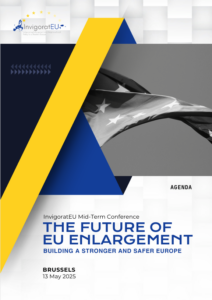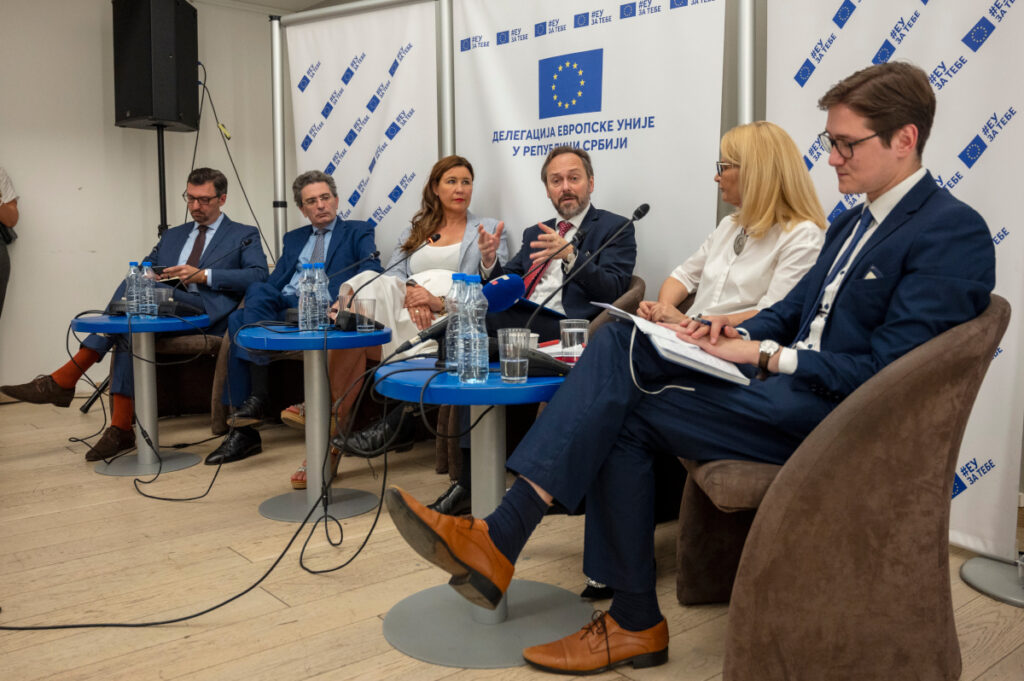Headquarters: Svetog Nauma 7, 11000
Office address: Đorđa Vajferta 13, 11000
Phone:: +381 11 4529 323

On the premises of the EU Info Centre in Belgrade, a panel discussion, From Sweden to Spain: New Trio, New Ideas, was organised by the EU Delegation to Serbia and the European Policy Centre (CEP). Panellists at the event were the Minister of European Integration, Tanja Miščević, Ambassador of the Kingdom of Sweden, H.E. Ms Annika Ben David, Ambassador of the Kingdom of Spain, H.E. Raul Bartolome Molina, Ambassador of the EU to Serbia, Emanuele Giaufret, and Chairman of the Governing Board, Srđan Majstorović. The panel was moderated by Strahinja Subotić, Programme Manager and Senior Researcher at CEP.

Sweden’s presidency of the EU Council ends today, and its priorities were a greener, safer, and freer Europe. Ambassador of the Kingdom of Sweden in Serbia, H.E. Ms Annika Ben David, highlighted the results of her country within all three priorities. Fit for 55 is the EU’s most comprehensive initiative to reduce pollution by 55% and make Europe the first climate-neutral continent by 2050. „The Russian aggression against Ukraine made Europe more united and stronger, and during the Swedish Presidency of the EU Council, it sent a million different pieces of weapons and a billion euros in financial aid and adopted two packages of sanctions against Russia,“ said Ben David. Regarding enlargement, Sweden is pragmatic and supports any country that wants to become a member that meets the membership criteria.
„Spain once recognised membership in the European Community as a national interest. Therefore, there should be no doubt when it comes to Serbia’s membership in the European Union,“ said Molina. He pointed out that Spain’s priorities represent continuity with Sweden’s priorities in the work of the EU Council, so Spain will focus on the Green Agenda, economic development, and strengthening European unity, especially when it comes to the enlargement policy. „Regardless of the upcoming parliamentary elections in Spain, all political parties agree on Spain’s priorities for the Presidency, and those elections will not negatively affect the presidency,“ he said.
Minister Miščević said that the opening and closing of clusters and chapters were not a sign of progress of Serbia towards the EU, but the actual progress is the quality of reforms implemented. „Serbia is building a culture of independent judiciary by adopting constitutional and legal changes in the area of the rule of law and is currently working on adopting additional by-laws,“ said Miščević. In addition, Serbia has shown progress in harmonising the EU visa regime and is actively working on energy diversification, which is important for economic and geopolitical reasons. When asked about the reorganisation of the team for accession negotiations of Serbia to the EU, Miščević pointed out that it is still an unresolved question for the government and will be presented to the public when the Government of Serbia makes a final decision.
Ambassador of the EU to Serbia, H.E. Emanuele Giaufret, has the opinion that a new moment for enlargement has arrived, and the renewal is political will, but that we must have a merit-based process. Concrete changes can already be seen in the example of the common purchase of gas and the participation of candidates in the discussion. „The EU shows its commitment to the integration of the Western Balkans through the access to the EU Single Market, the increase of pre-accession funds, digitalisation and accelerated regional integration for the Western Balkans announced by the President of the European Commission, Ursula von der Leyen. The offer of membership for the Western Balkans is on the table, and the EU is looking for ways to concretise the benefits for citizens and candidate countries,“ said Giaufret.
Majstorović emphasised the importance of the proper functioning of democratic institutions for EU membership and their reliance on the rule of law. He also mentioned that raising the level of compliance with the Common Foreign and Security Policy of the EU and restrictive measures, as well as the normalisation of relations with Kosovo, are necessary so that Serbia can progress in the accession process. Majstorović added that the Western Balkans are missing an opportunity as the focus shifts eastward towards countries fighting for their right to be part of the European family.
Finally, European Policy Centre is working on a new proposal for staged accession to the EU to encourage both Western Balkan countries and EU members to complete the enlargement process.
This event is part of a traditional practice that CEP and the EU Info Centre started six years ago, with the aim of starting a quality debate on EU priorities from the point of view of the countries presiding over the Council of the EU (outgoing and upcoming presiding countries), with reference to current topics in the accession process. Serbia EU. The twice-yearly event gathers representatives of the diplomatic corps, state institutions, and civil society organisations and is widely covered by the media.